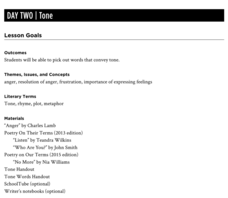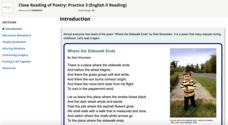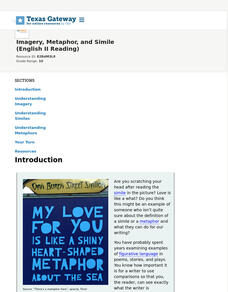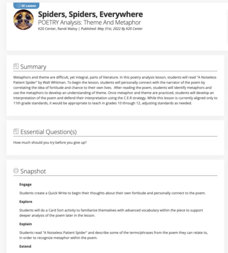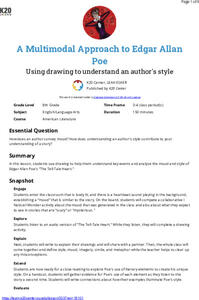Curated OER
Poetic Devices
Introduce middle schoolers to poetic devices with a lesson that asks them to find examples of alliteration, anaphora, onomatopoeia, metaphors, similes, and personification in various poems. Young scholars craft examples of these poetic...
Curated OER
Tone
Identifying the tone in a piece of writing can be tricky. Readers don't have the advantage of studying the images and colors used in a painting or the instruments and sounds of a song. The second lesson in this poetry unit teaches tweens...
Academy of American Poets
Teach This Poem: "somewhere i have never travelled,gladly beyond" by E. E. Cummings
Scholars engage in a role-play exercise, compare their demonstration to a time-lapse video, and to a poem by E.E. Cummings. The ensuing discussion asks learners to consider the similarities among the three.
Texas Education Agency (TEA)
Simile and Metaphor (English III Reading)
The key idea in this interactive exercise designed for high schoolers is that figurative language, especially similes, and metaphors, add layers of meaning to a text. Users examine examples from speeches, ads, movie dialogue, and poems,...
Texas Education Agency (TEA)
Allusion (English II Reading)
The eighth lesson in a series of reading interactives focuses on allusions and what these literary devices add to a text. Readers examine examples of four types of allusions: mythological, religious, historical, and literary. They then...
Texas Education Agency (TEA)
Close Reading of Poetry: Practice 3 (English II Reading)
Poems by Shel Silverstein, Emily Dickinson, Jean Toomer, Maya Angelou, and others offer users of the final interactive in a ten-part set to demonstrate what they have learned about how writers use imagery, metaphors, allusions, and...
Texas Education Agency (TEA)
Imagery, Metaphor, and Simile (English II Reading)
The sixth interactive in this series introduces learners to the power of figurative language. After studying examples of similes and metaphors, readers examine how such comparisons help them see through a writer's eyes. Interactive...
Utah Education Network (UEN)
7th Grade Poetry: Assess
To assess what scholars have learned throughout a five-lesson poetry unit, seventh graders first craft a Shakespearean sonnet based on a poem they have studied. In part two of the assessment, scholars complete a four-texts performance task.
Utah Education Network (UEN)
7th Grade Poetry: Ode Poem
Walt Whitman's "Captain, My Captain" and Robert Frost's "The Road Not Taken" provide seventh graders with examples of odes. After reading and discussing these and other examples, young poets craft an ode and respond to the ode of a...
Utah Education Network (UEN)
7th Grade Poetry: Metaphor Poem
The second lesson in a five-part poetry unit asks seventh graders to construct a metaphor poem. First, pupils examine Emily Dickinson's "The Railway Train" and identify the metaphor. They then select an object and an animal and craft a...
Academy of American Poets
Incredible Bridges: “Cotton Candy” by Edward Hirsch
Read it, hear it, see it, do it! Young poets experience Edward Hirsch's memory poem, "Cotton Candy," by first closely reading the poem silently, then aloud, watching a video of the poet reading it, and crafting their memory poem of an...
Curated OER
Abigail and John in Love
The second lesson in the series asks groups to analyze an exchange of love letters between Abigail and John Adams. Scholars identify the many allusions and references in the letters and consider what they can infer about the writers.
K20 LEARN
Spiders, Spiders, Everywhere: Poetry Analysis - Theme And Metaphor
Walt Whitman's poem "A Noiseless Patient Spider" provides high schoolers an opportunity to reflect on the importance of perseverance and fortitude. After drafting a Quick Write about a time they tried and tried again to accomplish...
K20 LEARN
Say It with Style: Syntax and Parallel Structure
Dr. Martin Luther King, Jr.'s "I Have a Dream" speech provides the text for a lesson that introduces scholars to the significance of syntax. After examining several types of clauses, phrases, and structures, class members use the...
K20 LEARN
Nose Like a Cherry: Understanding Similes and Metaphors
Clement Moore's "Twas the Night Before Christmas" models the power of descriptive language for middle schoolers. They identify the similes and metaphors in the tale and consider what these descriptions add to the story's emotional...
K20 LEARN
My Love Is Like Figurative Language: Figurative Language in Romeo and Juliet
My love is like an anaconda. Huh? Scholars investigate similes, metaphors, hyperbole, and personification used by writers to express feelings. They examine lyrics from songs and lines from Romeo and Juliet and consider how the use of...
K20 LEARN
Where I'm From: Poetry
We carry memories of where we're from; tweens and teens can capture these memories by first listening to several memory poems and then crafting their own. They analyze literary devices other poets use, brainstorm a list of images they...
K20 LEARN
Texture Poetry: The Great Gatsby and the Sense of Touch
To prepare for crafting a descriptive poem about a character in F. Scot Fitzgerald's The Great Gatsby, groups describe the texture of objects hidden in small bags. Individuals then select a character from the novel and an object...
K20 LEARN
Lord of the Flies Unit, Lesson 1: I'm A Survivor
What three readily available things would you grab in case of an emergency? That's the question that launches a unit study of William Golding's The Lord of the Flies. After sharing their choices, class members read Golding's rationale...
K20 LEARN
Criminal Motivations: Irony and Characterization In "The Cask Of Amontillado"
Edgar Allan Poe's short story "The Cask of Amontillado" is a bit of a puzzle. Critics have long debated Montresor's motives for killing Fortunato. Young scholars examine examples of the three types of irony (verbal, dramatic, and...
K20 LEARN
A Multimodal Approach To Edgar Allan Poe Using Drawing To Understand An Author's Style
True! Poe's "The Tell-Tale Heart" makes readers nervous. But how? Young scholars create a drawing while listening to a reading of Poe's eerie tale to understand how writers create the mood of their stories and what their writing style...
Penguin Books
Teacher's Guide: I Know Why the Caged Bird Sings by Maya Angelous
Maya Angelou's I Know Why the Caged Bird Sings is controversial. Like many other Angelou books, it is frequently challenged or banned from schools. In fact, Angelou is one of the most frequently banned authors in the United States. An...
Penguin Books
An Educator Guide to Call Us What We Carry by Amanda Gorman
Call Us By What We Carry, a poetry collection by Nation Youth Poet Laureate Amanda Gorman, is the focus of a 10-page teacher's guide.
Penguin Books
Teacher's Guide: When the Emperor Was Divine by Julie Otsuka
Julie Otsuka's haunting novel, When the Emperor Was Devine, is the subject of a 14-page teacher's guide. The guide includes the text of an interview with Otsuka, background information about Japanese immigration to the United States, and...



